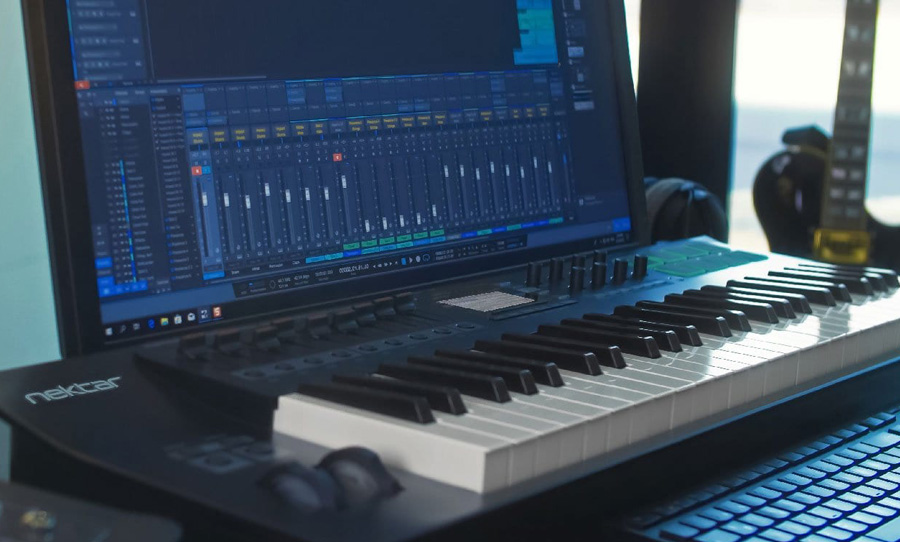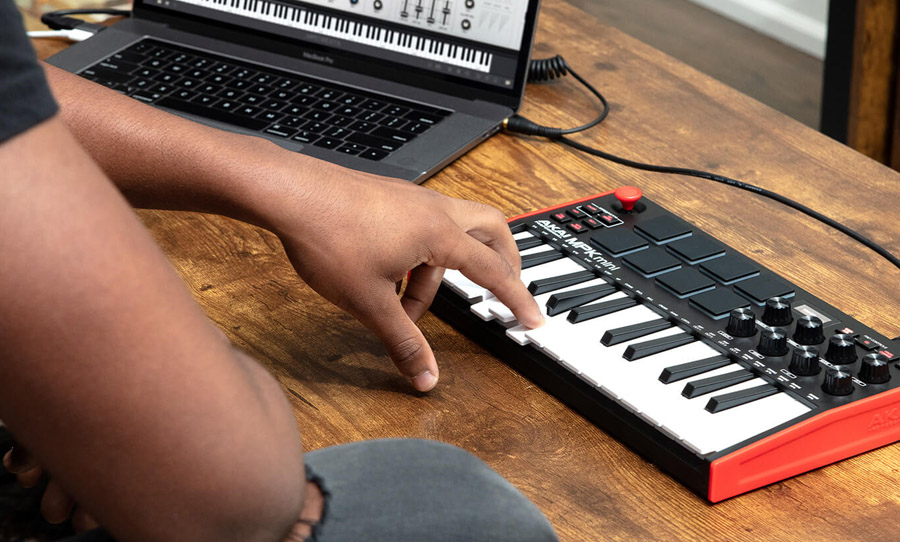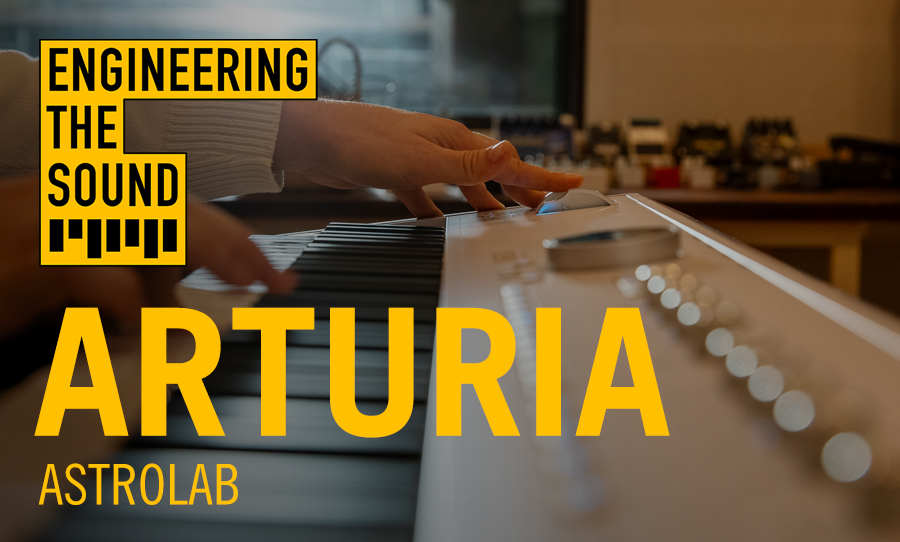The MIDI keyboard is one of the essentials in any studio, for amateurs and professionals alike. Here are 12 of the best you can get in 2021.
The MIDI keyboard is a versatile tool of music production, and increasingly, the central hub of the studio. Whether you’re recording beats, performing keys parts, or doing sound design, the MIDI keyboard allows you to manipulate MIDI expression in myriad ways.
Nowadays, some MIDI keyboards fully integrate into DAWs, offering onboard a plethora of controls for software functions. There’s a whole range of options out there, so here’s a list of the best you can get in 2021.

Alesis Q series
During the recent NAMM 2021, studio stalwarts Alesis announced 3 new options for MIDI control via the keyboard. The Q series comes in 32, 49 and 88-key versions, meaning that you can access intuitive portable MIDI-control, all the way up to a full-size piano set up.
There are also a few freebies chucked-in for good measure, like Pro Tools First, MPC Beats, and you’ll also get 60 free keyboard lessons from Melodics.
Read more about the Q series on the Alesis website.
CME XKey
CME do clever things with MIDI. We recently took a closer look at its WIDI Master, a wireless MIDI adaptor that connects devices wirelessly and, quite magically, without incurring any obvious latency. So it only stands to reason that the XKey MIDI keyboard is an innovative little device.
Remarkably light, with full-size, velocity-sensitive keys, this Bluetooth controller has incredibly impressive latency stats, plus, you can hook it up to your iOS devices. Producing on the go? The XKey has to be high on your shopping list.
Read more about the XKey on the CME website.
AKAI MPK mini MIDI
The MPK mini MIDI controller aims to offer “everything the modern producer demands” in a compact size. It includes 8 drum pads, 8 endless encoders, arpeggiation and its Gen 2 enhanced dynamic keybed.
This keybed is designed to offer a nuanced response during performance, no matter what sound you’re using. The MIDI keyboard also features a sustain-pedal input jack, USB connectivity, and a 4-way joystick for pitch & modulation control. Incredible functionality for a desktop-friendly device.
Read more about the MPK Mini on the AKAI website.
M-Audio Oxygen Pro Series
Freshly released, the M-Audio Oxygen Pro Series is available in 25, 49, 61, and mini key versions. They’re all USB powered and feature OLED screens, smart chord and smart scale technology, auto-mapping, a built-in arpeggiator and note repeat.
In terms of control, the Pro 49 and 61 have 16 RGB backlit velocity-sensitive pads and nine assignable faders. All of the Pro versions have eight assignable knobs, 5-pin MIDI output, while the mini key version incorporates eight performance pads, four knobs, and four faders into its compact design.
Read more about the Oxygen Pro Series on the M-Audio website.
Presonus ATOM SQ
Designed to work hand-in-glove with Studio One, the Presonus ATOM SQ MIDI and DAW controller packs a lot into its small size. This is due to its unique way of controlling MIDI, which revolves around the set of pads on the front of the device
The pads can function as a standard keyboard controller, 16-step sequencer, or as drum pads, meaning the controller can be super versatile, as well as compact. It’s also worth mentioning it can be used with any DAW but integrates best with Studio One.
For more about the ATOM SQ visit the Presonus website.
ROLI LUMI Keys Studio Edition
ROLI has recently announced the Lumi Keys Studio Edition, and has described it as the “World’s first 4D keyboard”. It features per-key pitch bend, polyphonic aftertouch, whole-key illumination, DS5.5 sized keys, and expandability through magnetic connectors.
Expandability turns LUMI into a modular MIDI keyboard, which can be paired with multiple LUMI’s, or Lightpad Blocks. On its own, the controller is very compact, just like ROLI’s other MIDI keyboard, the Seaboard Block.
Read more about LUMI on the ROLI website.
Nektar Panorama T4/T6
In the Nektar Panorama series lies the T4 (49 keys) and T6 (61 keys); both are intuitive and feature-packed. They both offer Nektar’s synth action MkII keys with aftertouch, which provide a semi-weighted action. The unique selling point of these MIDI controllers: DAW integration.
You can control the DAW’s faders, pan pots, transport, and track changes via the onboard function buttons, but each offers a deeper level of control by holding down the shift key (e.g. setting loop points). Along with this, there are eight pads, nine 30mm faders, eight buttons, eight encoders (all MIDI-assignable), octave up/down, and a 128×64 pixel LCD screen. This is MIDI control at a premium level.
Read more about the Panorama T4 and T6 on the Nektar website.
Novation Launchkey Mini Mk3
Novation crams a lot of value into its small and affordable MIDI keyboard. It is designed to be used with Ableton Live (although it can be used with other DAWs) and offers plug-and-play control over a range of the DAW’s features.
The controller also features 25 keys, 16 pads, pitch and mod strips, a MIDI output, and more. It’s definitely a good choice if you’re just starting out, or if you’re looking for a keyboard to chuck in your backpack on the way to your next session.
Read more about the Launchkey Mini Mk3 on the Novation website.
Arturia KeyLab MkII (49, 61)
Arturia describes the KeyLab MkII as “the definitive MIDI controller keyboard”. The keyboard includes a range of features, like a professional keyboard with velocity and pressure sensitivity, 16 backlit pads, a dedicated DAW command panel with magnetic overlays for various software, chord modes, and inputs for sustain and expression pedals.
As well as MIDI connections, the keyboard includes four CV outputs and one CV input for hooking up to modular synth rig. Housed in an aluminium and wood casing, the KeyLab lends any studio an air of solidity.
Read more about the KeyLab MkII on the Arturia website.
Native Instruments Komplete Kontrol S88
The Native Instruments Komplete Kontrol S88 is about as close to a real piano as you’ll get on this list. It has an 88-key hammer-action Fatar keybed, which is fully weighted and includes aftertouch. The MIDI keyboard also includes two displays which goes along with the DAW integration features.
The Komplete Kontrol S88 allows you to control Logic Pro X, Cubase, Ableton Live, Nuendo, or Garageband features directly from the keyboard. There is a range of function buttons, from record to quantise which allows you to control the DAW from the keyboard.
Read more about the Komplete Kontrol on the Native Instruments website.
KORG microKEY 2 and microKEY Air
The KORG microKEY 2 lineup features a range of super simple MIDI keyboards, including 25, 37, 49, and 61 key versions. They include KORG’s Natural Touch mini keyboard and on the 37, 49, and 61-key models you can connect a damper pedal.
They are all USB powered, but if you’re looking to go wireless, the microKEY Air is well worth a try. It features a similar set of specs but can connect to your computer or phone over Bluetooth, no cables required.
Read more about the microKEY 2 and microKEY Air on the KORG website.
IK Multimedia iRig Keys
The iRig keys is a simple 37-key controller that’s incredibly slim and compatible with iPhone, iPad, iPod touch, Android and Mac/PC. To connect to iOS devices you just need the included lightning connector; for Android, you can use the included micro-USB cable and Mac/PC just use a regular USB cable.
It features modulation and pitch bend wheels, a volume/data knob (assignable), back-lit, soft-touch buttons, a Set button to store and recall four different customised setups, and an input for an optional sustain or expression pedal. It also has extremely low energy consumption, so can easily be powered by an iPhone.
Read more about the iRig Keys on the IK Multimedia website.



